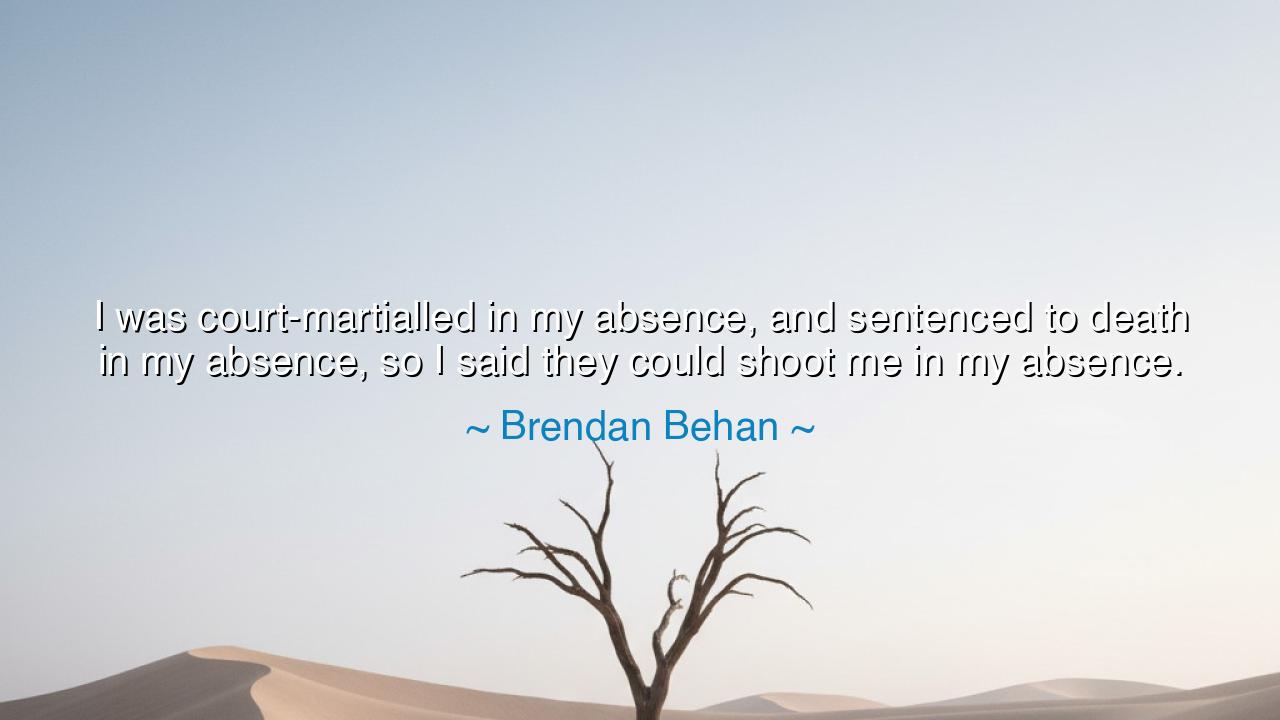
I was court-martialled in my absence, and sentenced to death in
I was court-martialled in my absence, and sentenced to death in my absence, so I said they could shoot me in my absence.






“I was court-martialled in my absence, and sentenced to death in my absence, so I said they could shoot me in my absence.” Thus spoke Brendan Behan, the Irish writer, rebel, and humorist whose tongue was as sharp as his wit was deep. Beneath the laughter that dances through this quote lies the indomitable spirit of a man who had faced authority, condemnation, and mortality — and refused to bow before any of them. In these words, Behan transforms punishment into parody, fear into defiance. He reminds us that when a system seeks to strip a man of dignity, laughter becomes the last and strongest act of rebellion.
The origin of this quote springs from Behan’s own life, which was as storm-tossed as the land that birthed him. As a young man in the turbulent 1940s, he joined the Irish Republican Army, driven by the dream of a free Ireland. Arrested for his revolutionary activities, he spent years in prison and exile. It was during these years of trial that his humor became his armor. When told he had been sentenced to death in absentia, he delivered this immortal retort — not with bitterness, but with a smile that mocked the absurdity of his oppressors. His jest was not born of ignorance, but of courage — the courage to face death without surrendering one’s humanity.
To say, “They can shoot me in my absence,” is to declare mastery over fear itself. It is to look the machinery of authority in the eye and say, “You may take my body, but not my spirit.” It is a statement of freedom so complete that it renders tyranny powerless. For what can be done to one who no longer trembles before the threat of punishment? The humor that shields Behan’s words is not light-hearted escape; it is defiant wisdom, the laughter of the soul that has found strength even in despair. Like the Stoic philosophers of old — Epictetus, who was born a slave yet claimed his mind could never be chained — Behan teaches that true liberty resides within.
Throughout history, the oppressed have wielded humor as both sword and shield. The Soviet dissidents under Stalin whispered jokes in the shadows to remind themselves that the tyrant, for all his power, could not command laughter. The Irish, through centuries of occupation and hardship, turned suffering into song, irony, and story. Behan stood in this proud tradition. His humor did not deny pain; it transcended it. In laughing at his own death sentence, he affirmed life — not the fragile life of the body, but the eternal life of the unconquered mind.
Yet there is something profoundly human in his jest. It acknowledges the absurdity of existence, the strange theater in which fate plays both tragedy and comedy. Behan understood that to live is to face contradictions — to suffer and to laugh, to despair and to hope. His humor became a philosophy: when the world becomes unbearable, one must bear it with wit. The ancient poets might have called it the laughter of the gods, the laughter that shakes the heavens because it springs from understanding, not ignorance.
In this, Behan stands beside other souls who turned pain into light. Consider Socrates, condemned unjustly to death by his own city. On the eve of his execution, he joked that death might simply be a long and restful sleep — a philosopher’s ideal repose. In that moment, like Behan, he robbed his captors of power. Both men taught the same lesson: that a free spirit cannot be killed, for it belongs not to the world, but to truth itself.
So, my child of courage and reason, take this teaching to heart: when life seeks to humble you, answer with laughter, not surrender. The tyrant, the critic, the circumstance — all lose their teeth when met with fearless joy. Cultivate the art of irony, not as mockery, but as strength. When fate hands you injustice, meet it as Behan did — with a wink, a jest, and a heart unbowed. For though the body may be condemned “in absence,” the soul that refuses fear is eternally present — undefeated, unbroken, immortal in spirit.
And thus, remember always: the man who can laugh in the face of death has already triumphed over it. Brendan Behan’s words are not only humor; they are heroism disguised as jest — a lesson that teaches us to meet the world not with tears, but with the fearless laughter of the free.






AAdministratorAdministrator
Welcome, honored guests. Please leave a comment, we will respond soon